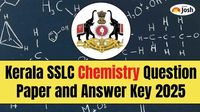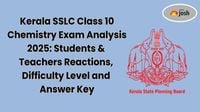The Kerala SSLC (Secondary School Leaving Certificate) Chemistry exam for the 2025 academic year has now concluded, marking a significant milestone for Class 10 students in Kerala. The exam took place on March 24, 2025, from 9:30 AM to 11:15 AM, with an additional 15 minutes allotted for reading the question paper.
This important assessment comprised a total of 20 questions, totaling 40 marks, and was segmented into four distinct sections aimed at evaluating different aspects of the students’ chemistry knowledge. Section A included 1-mark questions, Section B consisted of 2-mark questions, while Sections C and D included 3-mark and 4-mark questions, respectively. The structure was designed to assess both theoretical understanding and practical problem-solving skills.
Feedback from students regarding the exam has started pouring in. Initial reactions suggest that the exam presented a moderate difficulty level. Many students felt satisfied with their performance. While some encountered challenges with the numerical questions, others noted that the MCQs and theory-based questions were straightforward and directly from the syllabus.
According to reports, time management played a crucial role during the exam. Students who had prepared by practicing previous years' papers mentioned that they found the test relatively easy to attempt. Educational professionals echoed these sentiments, observing that the question paper was well-balanced across all sections.
One student shared, “I felt prepared going in because I had practiced several past papers. The theory questions were manageable, but I found a couple of the numerical questions a bit tricky.” This highlights the varied experiences students had, dependent on their preparation methods.
Teachers evaluated the exam structure and provided their insights as well. Many educators noted that the inclusion of assertion-reasoning questions required a deep understanding of the concepts rather than rote memorization. One teacher remarked, “The exam effectively covered key concepts from the syllabus and challenged students who relied solely on memorization.”
In terms of the content tested, the chemistry exam encompassed a wide range of topics. For instance, some of the significant questions included:
- Identifying minerals of aluminum and their applications.
- Understanding polyatomic molecules and their structural formulas.
- Explaining processes such as electroplating and its advantages.
- Analyzing reaction mechanisms in both simple and complex forms.
Exam preparation strategies were crucial, as noted by several students who managed their time well. “I practiced rigorously for weeks and even timed myself during mock tests. That made a difference when I actually sat for the exam,” another student shared, reflecting on their effective preparation.
Now that the exam has concluded, students are eagerly awaiting a comprehensive analysis of their performance and the answer keys to the Kerala SSLC Class 10 Chemistry Question Paper 2025. This valuable resource will not only serve as a tool for assessing individual performance but will also aid in conceptual understanding.
Shortly post-exam, detailed sets of the question paper alongside expert-curated answer keys will be made available. These documents are anticipated to illuminate the gaps in knowledge and reinforce learning objectives for future studies.
The answer key will help students in estimating their scores and identifying areas for improvement. As experts and educators delve into the exam’s results and overall impact, students will be able to review the responses and better prepare for future academic challenges.
The Kerala SSLC Chemistry exam 2025 signifies a crucial academic endeavor for students in Kerala, putting their knowledge and skills to the test in a comprehensive and structured manner. The combination of theoretical and numerical evaluation not only holds significance for grading but also plays a fundamental role in shaping these young minds for future academic pursuits.
As the dust settles on this year’s exam, reflections from both students and teachers provide a glimpse into the effectiveness of the education system and the preparedness of the students. It remains to be seen how the academic results will shape the students’ journeys ahead.
In conclusion, the Kerala SSLC Chemistry exam 2025 embodied the diligence and effort students have invested in their education. As students now await their results and analyses, the knowledge gained through this experience will serve them well beyond the classroom.


